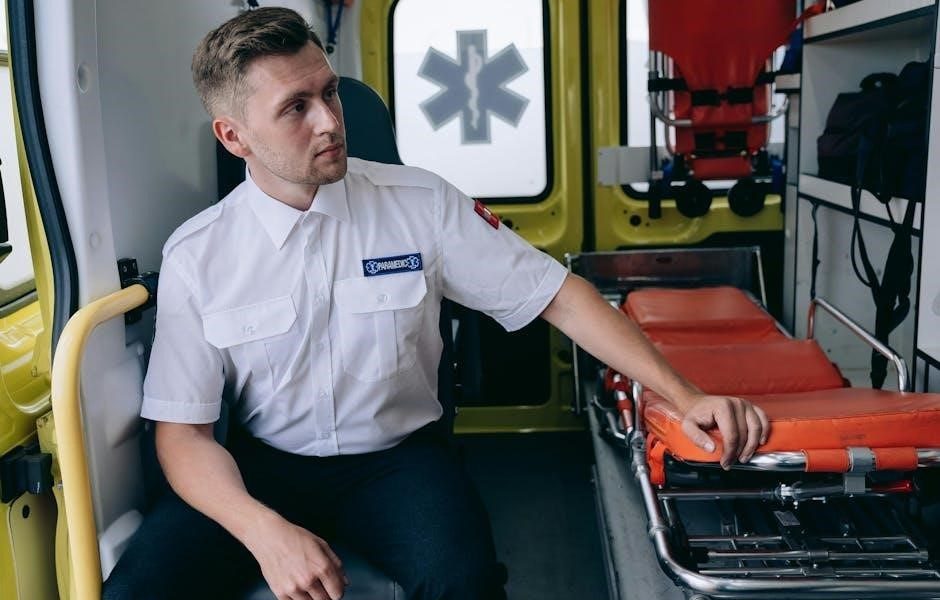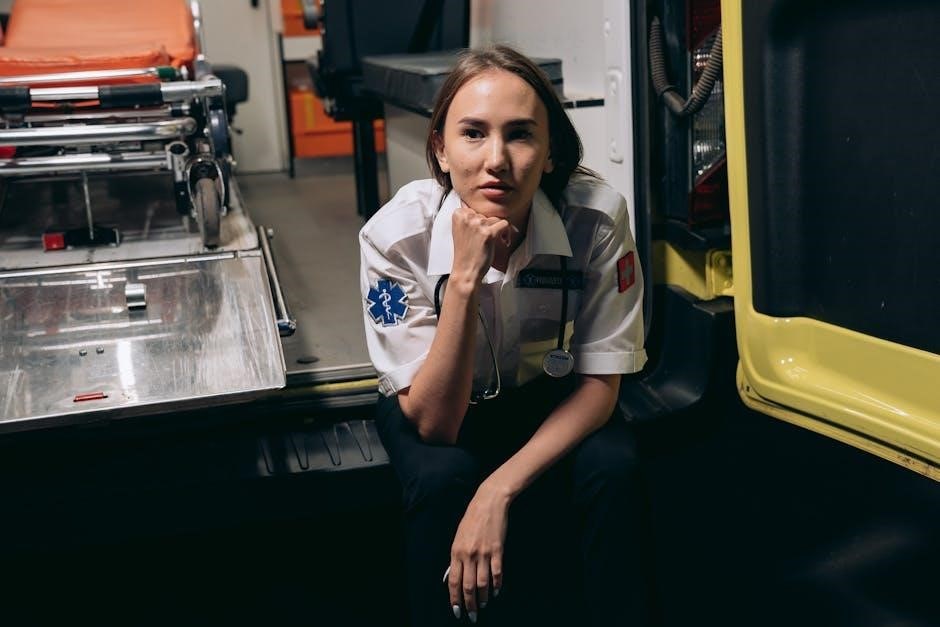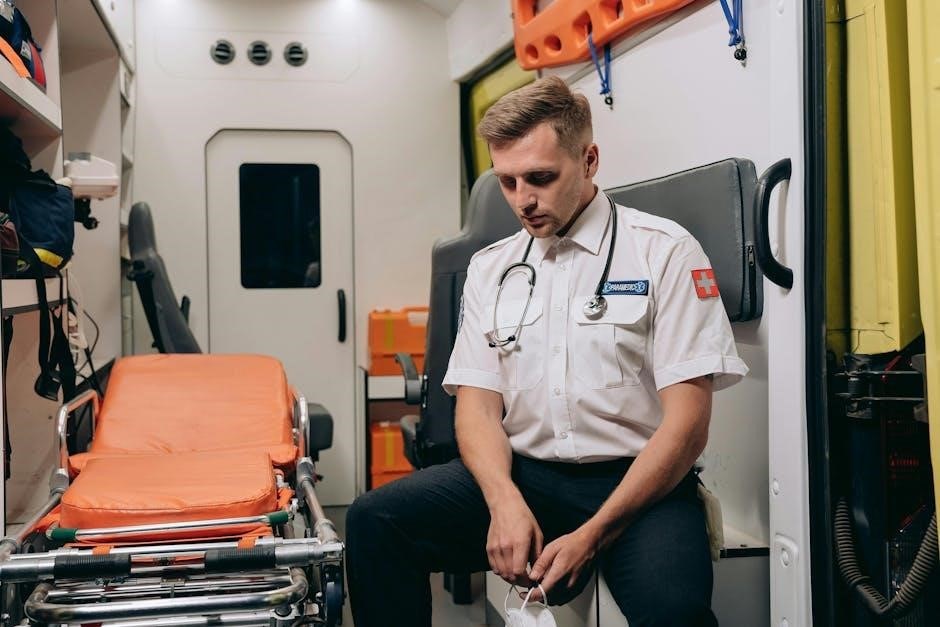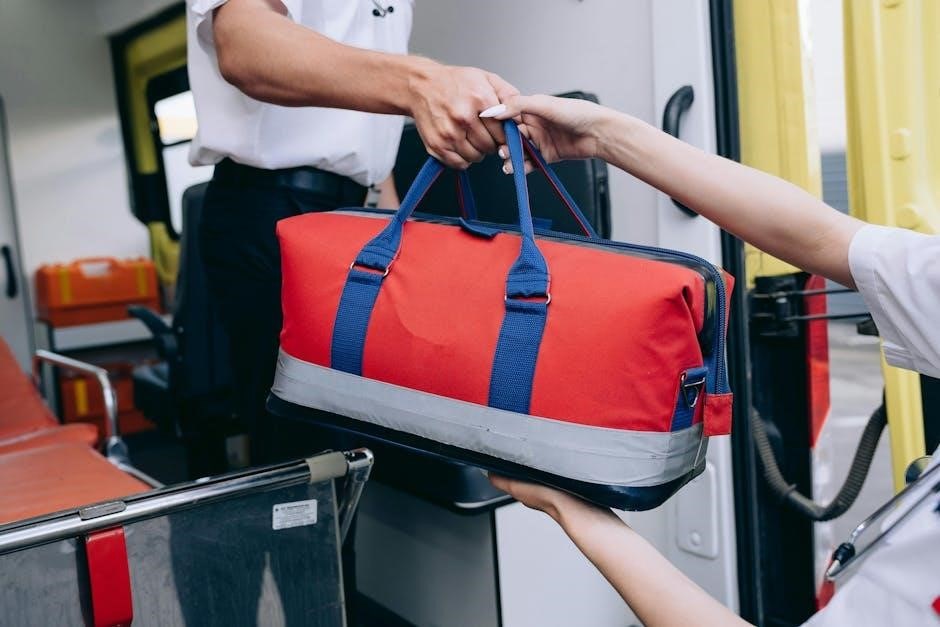
step 2 cs pdf first aid
The USMLE Step 2 CS assesses clinical skills, focusing on patient interaction, history-taking, and physical exams. It is a critical licensure requirement for medical graduates. First Aid for USMLE Step 2 CS is a widely recommended resource, offering practical guidance and case scenarios to aid preparation. The exam emphasizes real-world clinical competence, ensuring readiness for residency training.
1.1 Overview of the USMLE Step 2 CS Examination
The USMLE Step 2 CS is a hands-on exam evaluating clinical and communication skills. It focuses on patient encounters, requiring candidates to gather histories, perform physical exams, and document findings. The exam uses standardized patients to simulate real-world scenarios, testing a candidate’s ability to interact professionally and make accurate clinical decisions. It is a pass/fail assessment, with performance measured against established standards. The exam is divided into cases, each requiring efficient data collection and concise documentation. Resources like First Aid for USMLE Step 2 CS provide detailed case examples and strategies to excel in this section. This exam is critical for demonstrating practical competencies essential for medical licensure.
1.2 Importance of Step 2 CS in Medical Licensure
The USMLE Step 2 CS plays a pivotal role in the medical licensure process in the United States. It is one of the four exams required for physicians to obtain a medical license, ensuring they possess the necessary clinical skills to practice safely and effectively. Passing Step 2 CS demonstrates a candidate’s ability to interact with patients, diagnose conditions, and communicate findings clearly. This exam complements the knowledge assessed in Step 2 CK, providing a holistic evaluation of a physician’s readiness for residency training. Resources like First Aid for USMLE Step 2 CS are invaluable for preparation, offering insights into exam format and high-yield clinical scenarios. Success in this exam is a critical milestone for aspiring physicians, reflecting their readiness to transition into clinical practice.

Structure and Format of the Exam
The USMLE Step 2 CS involves real patient cases, focusing on history-taking, physical exams, and patient notes. Each case is timed, with standardized patients simulating clinical scenarios.
2.1 Components of the Step 2 CS Exam
The USMLE Step 2 CS exam consists of three main components: the Integrated Clinical Encounter (ICE), the Clinical Skills Assessment (CSA), and the Patient Note Writing Exercise. The ICE evaluates history-taking, physical exam, and communication skills through standardized patient encounters. Each case is timed, with candidates documenting findings and differential diagnoses. First Aid for USMLE Step 2 CS provides detailed case examples and strategies to master these components. Candidates must demonstrate proficiency in patient interaction, accurate documentation, and diagnostic reasoning. The exam emphasizes practical clinical skills, mirroring real-world patient care scenarios, ensuring readiness for residency training. Effective preparation with resources like First Aid is essential for success.
2.2 Clinical Skills Assessed in the Exam
The USMLE Step 2 CS evaluates essential clinical skills, including history-taking, physical examination, and patient communication. Candidates must demonstrate the ability to gather accurate patient histories, perform focused physical exams, and document findings effectively. Communication skills, such as empathy and professionalism, are also assessed. The exam uses standardized patients to simulate real clinical encounters, ensuring a realistic evaluation of clinical competence. First Aid for USMLE Step 2 CS provides detailed guidance on mastering these skills, emphasizing case-based learning and practical strategies. Proficiency in these areas is critical for success, as the exam reflects the clinical skills required in real-world patient care settings, preparing candidates for the challenges of residency training.

Preparation Strategies for Step 2 CS
First Aid for USMLE Step 2 CS and UWorld are indispensable resources, offering case simulations and practice questions to refine clinical skills and exam strategies effectively.
3.1 Key Resources for Effective Preparation
Effective preparation for the USMLE Step 2 CS requires a combination of high-quality resources. The First Aid for USMLE Step 2 CS is a cornerstone, offering detailed case simulations, practical tips, and a structured approach to mastering clinical encounters. Additionally, UWorld and other reputable question banks provide realistic practice scenarios, helping candidates refine their diagnostic and communication skills. Clinical guidelines and standardized patient videos are also valuable tools to enhance understanding of patient interactions. Utilizing these resources strategically ensures a comprehensive and well-rounded preparation, addressing both clinical knowledge and practical application. By integrating these materials into a structured study plan, candidates can build confidence and competence for exam success.
3.2 Role of First Aid for USMLE Step 2 CS

First Aid for USMLE Step 2 CS is a cornerstone resource for exam preparation, offering a comprehensive guide to mastering clinical skills. It provides detailed case simulations and practical tips to enhance patient interactions, history-taking, and physical exams. The guide is updated regularly to incorporate feedback from recent test-takers, ensuring alignment with the latest exam format. Its structured format includes high-yield information, mnemonics, and section summaries, making it an indispensable tool for focused study. By emphasizing real-world clinical scenarios, First Aid helps candidates understand exam expectations and develop effective strategies for success. Its student-to-student approach ensures relevance and practicality, making it a must-have for achieving proficiency in the CS exam.

Clinical Skills and Case Scenarios
The USMLE Step 2 CS evaluates practical patient care skills, including history-taking, physical exams, and communication. Common scenarios simulate real-world clinical challenges, preparing candidates for diverse patient encounters. First Aid provides detailed case simulations, helping learners master these skills effectively.
4.1 Common Case Scenarios in the Exam
The USMLE Step 2 CS features diverse patient encounters, including respiratory, cardiovascular, and neurological cases. Common scenarios involve diagnosing conditions like pneumonia, hypertension, and diabetes. First Aid for USMLE Step 2 CS provides detailed simulations, such as patient presentations with chest pain or shortness of breath. These cases test history-taking, physical exam, and differential diagnosis skills. The exam also includes pediatric, geriatric, and surgical cases, reflecting real-world diversity. Candidates must demonstrate effective communication and clinical reasoning, as highlighted in the First Aid guide. Practicing these scenarios enhances readiness for the exam’s challenging, realistic format.
4.2 Mastering History Taking and Physical Exams
Mastering history taking and physical exams is essential for success in the USMLE Step 2 CS. These skills are fundamental to accurate diagnosis and patient care. The First Aid for USMLE Step 2 CS PDF provides a structured approach to history taking, emphasizing organized patient encounters. Key areas include identifying chief complaints, reviewing systems, and documenting medications and allergies. For physical exams, the guide outlines step-by-step techniques for evaluating vital signs, cardiovascular, respiratory, and neurological systems. Practice with standardized patients helps refine these skills. The exam assesses both accuracy and professionalism, making rehearsal crucial. By following the strategies in First Aid, candidates can ensure comprehensive and efficient patient assessments, boosting their performance in real exam scenarios.

Time Management and Exam Tactics
First Aid for USMLE Step 2 CS PDF emphasizes efficient time management, allocating 15 minutes per case. Practice prioritizing tasks, ensuring thorough yet timely patient assessments and note-taking.
5.1 Efficient Time Allocation During the Exam
First Aid for USMLE Step 2 CS PDF highlights the importance of efficient time allocation. Each patient encounter allows 15 minutes, divided into 8 minutes for history-taking and 4 minutes for physical exams, with 3 minutes for note-writing. This structure ensures candidates complete all tasks within the allotted time. Practicing time management is crucial to avoid running out of time and missing critical components. The guide recommends prioritizing key symptoms and findings to streamline the process. By adhering to this framework, examinees can maintain composure and deliver thorough patient assessments, enhancing their performance in the exam setting. Effective time management is a cornerstone of success in the Step 2 CS exam.
5.2 Strategies for Handling Challenging Cases
Challenging cases in the USMLE Step 2 CS require a structured approach. First Aid for USMLE Step 2 CS PDF emphasizes staying calm and systematic. Begin with open-ended questions to gather detailed histories, then focus on relevant physical exams. Prioritize identifying key findings and red flags. If unsure, consider differential diagnoses and document thoroughly. Mnemonics can help recall critical steps. Practice mock cases to build confidence and adaptability. Time management is key; allocate seconds to each task. Seeking clarification when needed is acceptable. Reviewing common case scenarios in preparation ensures readiness for unexpected situations. By staying organized and methodical, candidates can effectively navigate even the most difficult patient encounters during the exam. This strategic mindset is vital for success in high-pressure clinical settings.

Practice Materials and Study Guides
First Aid for USMLE Step 2 CS PDF is a cornerstone resource, offering detailed case scenarios and exam strategies. UWorld provides realistic practice questions, enhancing clinical decision-making skills. Together, these tools are essential for thorough preparation and mastery of the exam format.
6.1 First Aid for USMLE Step 2 CS PDF
The First Aid for USMLE Step 2 CS PDF is a widely used resource for exam preparation, offering detailed case scenarios and practical strategies. Updated regularly, it aligns with the latest NBME exam format, ensuring relevance for candidates. The guide focuses on high-yield clinical cases, history-taking techniques, and physical exam skills, making it indispensable for mastering the exam. It incorporates feedback from recent test-takers, providing insights into common challenges and effective approaches. Available in digital formats, the PDF version allows easy access and portability, enabling candidates to study efficiently. Its structured content and concise explanations make it a valuable tool for achieving success in the Step 2 CS exam.
6.2 UWorld and Other Practice Question Banks
UWorld is a leading resource for USMLE preparation, offering a comprehensive Qbank for Step 2 CS. Its interactive platform provides high-yield clinical scenarios, simulating real exam conditions. The detailed explanations and performance tracking help identify weaknesses. Other practice question banks, such as Kaplan and COMBANK, also offer similar benefits, with a focus on case-based learning. These tools are essential for mastering clinical skills and time management. They complement resources like First Aid for USMLE Step 2 CS, ensuring a well-rounded preparation strategy. By practicing with these question banks, candidates can refine their approach to patient interactions and physical exams, boosting their confidence and performance on exam day.

Feedback and Improvement
Utilizing feedback from practice exams and mentors helps identify weaknesses. Regular review of performance metrics and case simulations ensures continuous improvement. Adaptation of study strategies strengthens clinical competence effectively.
7.1 Utilizing Feedback for Performance Enhancement
Feedback is a cornerstone of improvement in preparing for the USMLE Step 2 CS. By analyzing performance metrics and case simulations, candidates can identify areas of weakness and refine their clinical skills. The First Aid for USMLE Step 2 CS guide provides practical examples of common pitfalls and strategies to overcome them. Regular self-assessment and peer review help in addressing gaps in history-taking, physical exams, and patient communication. Incorporating feedback into study plans ensures targeted practice, leading to significant performance enhancement. Continuous learning and adaptation are essential for mastering the clinical scenarios encountered in the exam. Leveraging feedback effectively fosters confidence and competence, ultimately improving overall exam readiness and success.
7.2 Continuous Learning and Adaptation
Continuous learning and adaptation are vital for excelling in the USMLE Step 2 CS. The First Aid for USMLE Step 2 CS guide emphasizes staying updated with clinical practices and exam formats. Regular review of case scenarios and feedback helps in refining skills. Candidates should adapt their study strategies based on performance metrics and evolving exam content. Engaging in active learning through practice exams and peer discussions enhances problem-solving abilities. By staying proactive and flexible, candidates can master the clinical skills required for success. Adaptation ensures that learners remain aligned with the latest standards, making continuous improvement a cornerstone of their preparation journey. This approach fosters resilience and ensures readiness for the challenges of the exam and future medical practice.

Exam Day Tips and Tricks
Arrive early, stay calm, and systematically approach each case. Use the First Aid guide for last-minute reviews. Organize materials, maintain confidence, and adhere to time limits strictly.
8.1 Preparing for the Exam Day
Preparing for the USMLE Step 2 CS exam day requires a well-structured plan. Start by reviewing the First Aid for USMLE Step 2 CS guide, focusing on high-yield clinical scenarios and common case presentations. Ensure you are familiar with the exam format, including the timing and structure of patient encounters. Practice history-taking and physical exam techniques to build confidence and efficiency. Rest and mental preparation are crucial; avoid last-minute cramming and ensure adequate sleep. Organize your materials, including identification and any required documents, and double-check the exam schedule and location. Simulate exam conditions during practice sessions to refine your approach. Arrive early to avoid unnecessary stress and maintain a calm, focused mindset throughout the day.
8.2 Maintaining Composure During the Exam
Maintaining composure during the USMLE Step 2 CS exam is essential for optimal performance. Deep breathing exercises and positive self-talk can help manage anxiety. Staying focused on each patient case individually prevents overwhelm. Time management is critical; allocate minutes wisely for history-taking and physical exams. If unsure about a diagnosis, document findings clearly and move forward. Remember, the exam assesses clinical skills, not perfection. Visualize success and remind yourself of thorough preparation using resources like First Aid for USMLE Step 2 CS. A calm and confident demeanor enhances patient interaction and decision-making. Stay hydrated, avoid rushing, and approach each case methodically to ensure a composed and professional performance throughout the exam.

Resources for Further Learning
Recommended books like First Aid for USMLE Step 2 CS and online forums provide valuable insights and study materials. Utilize these resources for comprehensive exam preparation and continuous learning.
9.1 Recommended Books and Guides
Several books and guides are highly recommended for preparing for the USMLE Step 2 CS. The First Aid for USMLE Step 2 CS is a top choice, offering detailed case scenarios, practical tips, and a focus on high-yield topics. It is regularly updated to reflect the latest exam format and feedback from recent test-takers. Other notable resources include Master the Boards: USMLE Step 2 CS and Clinical Skills for the USMLE Step 2 CS. These guides provide comprehensive coverage of clinical encounters, history-taking, and physical examination techniques. Additionally, the USMLE Step 2 CS Core Cases is another valuable resource, featuring common patient presentations and practice cases. These books are essential for mastering the clinical skills assessed in the exam and boosting confidence and performance.
9.2 Online Communities and Forums
Online communities and forums are invaluable resources for USMLE Step 2 CS preparation. Platforms like Reddit’s r/USMLE and Student Doctor Network offer extensive discussions, tips, and shared experiences from candidates who have taken the exam. These forums often include threads about the First Aid for USMLE Step 2 CS guide, with users sharing insights on how to best utilize it. Many participants discuss challenging case scenarios, strategies for improving clinical skills, and advice for managing exam day nerves. Additionally, these communities often share links to study materials, including PDFs and practice case scenarios; Engaging with these forums provides a sense of camaraderie and access to real-world advice, helping candidates stay informed and motivated throughout their preparation journey.
Related Posts

matthew desmond evicted pdf
Dive into Matthew Desmond’s groundbreaking ‘Evicted’ with our convenient PDF! Understand housing insecurity & its impact. Download, read, & share this essential resource now.

fish in a tree pdf
Dive into Lynda Mullaly Hunt’s heartwarming ‘Fish in a Tree’! Download the PDF or read it instantly. Discover Ally’s journey & embrace being wonderfully different. ✨

majestic princess deck plan pdf
Planning a Majestic Princess cruise? Download our detailed, easy-to-read deck plan PDF now! Find cabins, dining, pools & everything you need for an unforgettable voyage. ✨